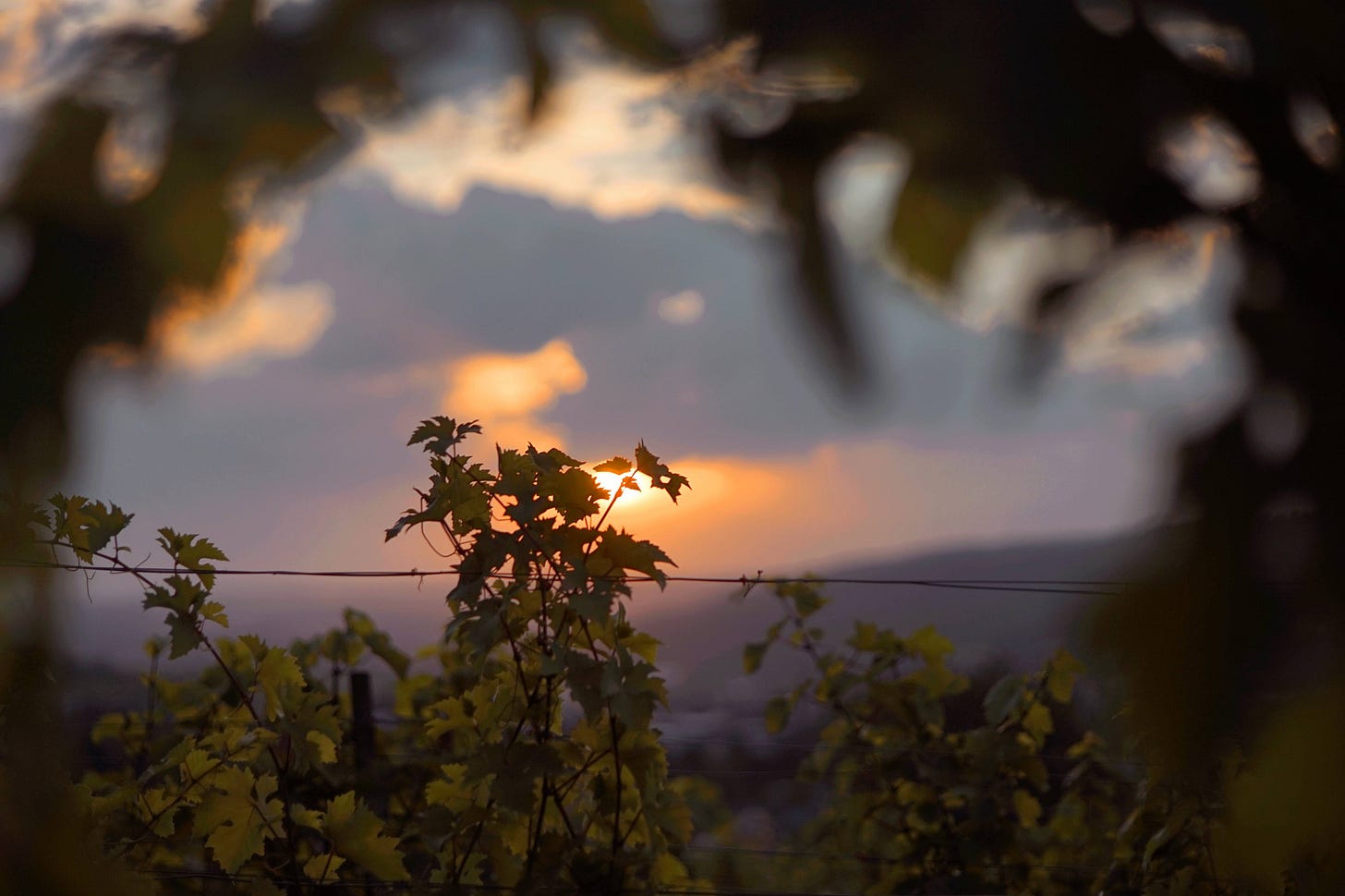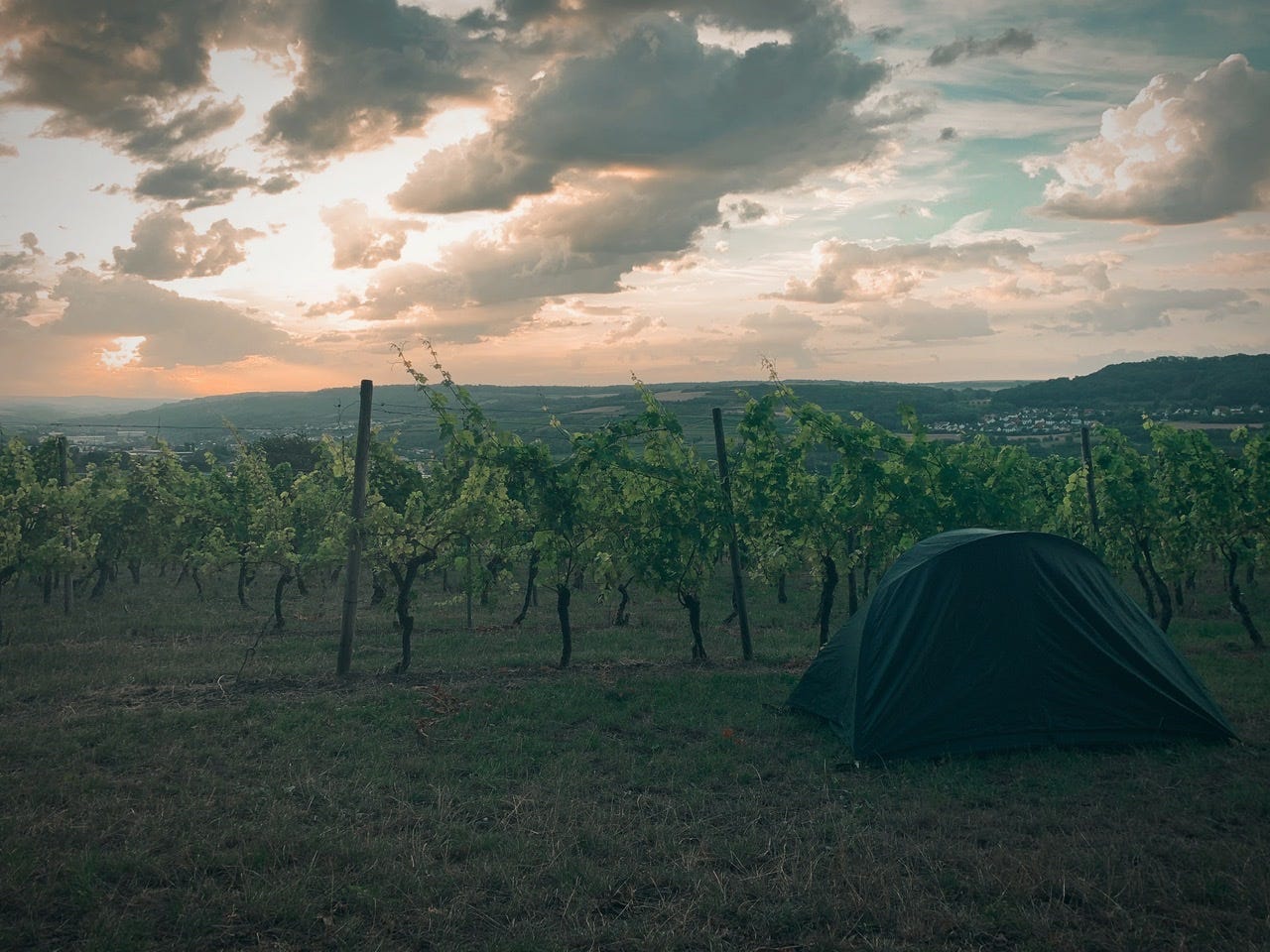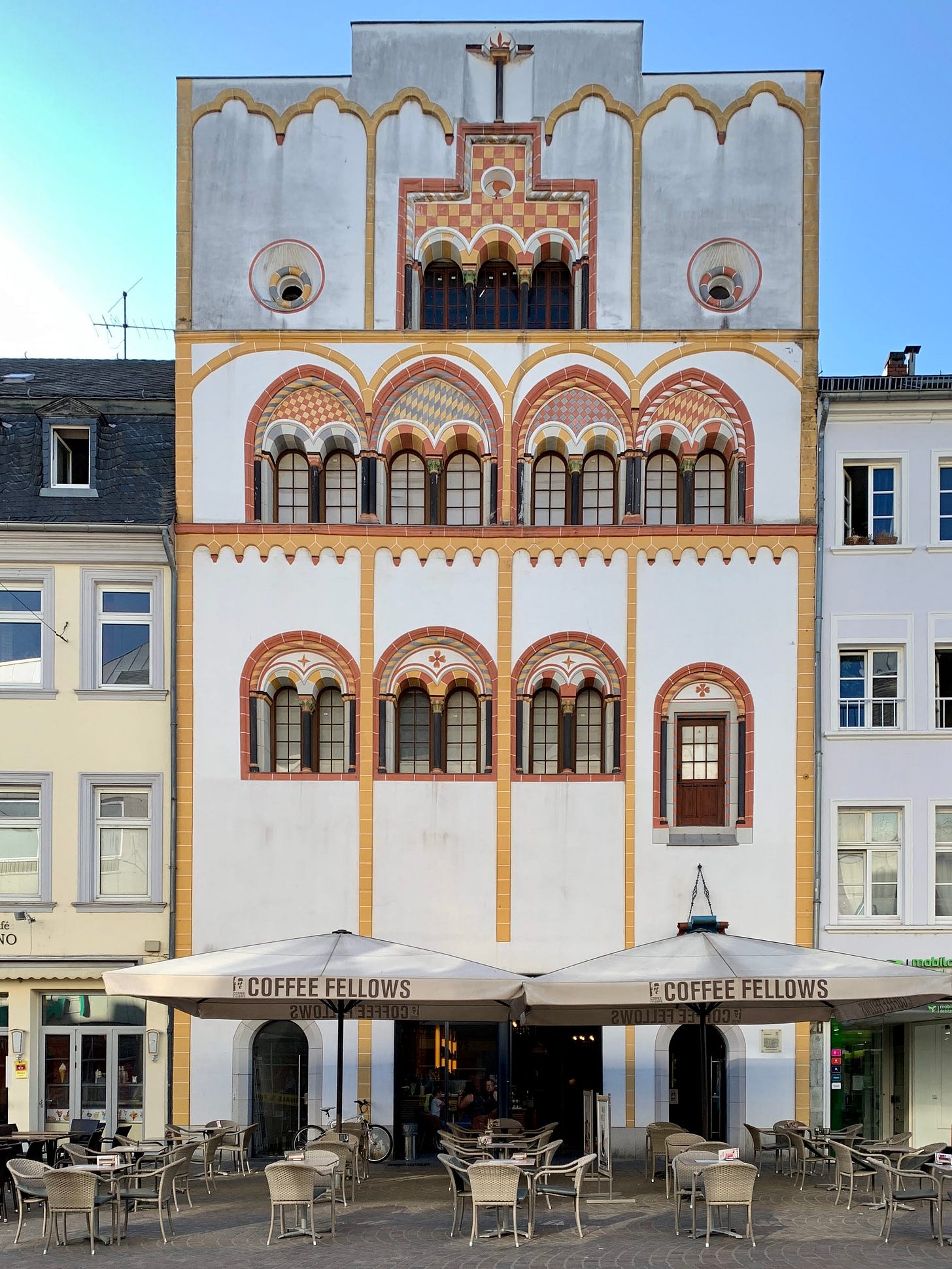gentle reader, welcome to a flustered edition of enda lettere, an almost-bi-weekly newsletter about walks, weather, and wonder, in which i’ll try to tell you the story of a short walk along the river Moselle/Mosel/Musel in July 2020. and i will inevitably fail, because there are stories meant to be shown, not told. nevertheless, here is to a light-hearted, summery collection of moments. tchin-tchin!1
where should i begin? i walked out one midsummer morning—no, wait, that was Laurie Lee. i walked out one midsummer evening and headed to the coach station in Hamburg with a bus ticket to Trier via Brussels and Luxembourg in my pocket. this unnecessarily complicated route is cheap enough, even when booked fairly spontaneously, and it would have enabled me to have a hearty breakfast in Brussels if everything was normal. why that seemed like a good idea during the summer lull of the pandemic is long forgotten; there was no café or bakery open at the ungodly hour of my arrival, only policemen haranguing those who chose to wear masks covering only their mouth.
“no Luxembourg. i repeat, no Luxembourg!” the bus driver shouted and a bewildered crowd looked at him incredulously. “nobody go to Luxembourg today. no stop. Luxembourg: problem with Corona,” he added.
a good start to my completely unnecessary summer vacation, i thought and rolled my eyes. this is stupid, i shouldn’t be here, i shouldn’t even be in Europe, i whined to myself. that day in July 2020 i should have been somewhere around Tabriz, basking in Islamic culture, eating cheese from Liqvan. but for now, my plan was to walk a bit, sleep outside, eat fruit and bread for a week and possibly forget about everything. to loll about, preferably in Luxemburg.
there were no hard criteria for that walk, no strict framework, no set plan—i longed for the freedom of informed improvisation, the freedom of proudly going nowhere in particular, the freedom of immersion. due to various real-life obligations, i knew i had about a week to unsuspend time and touch the world and look. so when it turned out there, at the bus stop, that the circumambulation of Luxembourg seems to be impossible, i just shrugged and checked my ticket again: for some mysterious reason i had indeed bought one to Trier instead of Luxembourg city.
from the moment of my arrival to the oldest city of Germany and subsequent departure for Wintrange (for it was quite possible to enter Luxembourg, with local trains running, even amidst the sudden, virus-induced panic), this story falls apart. this fidgeting with words and places feels awfully foolish, and so i imagine myself, like the tarot’s fool, wandering aimlessly, singing songs to the moon and the ancient walls of slate along the river Moselle/Mosel. this story is rather a sensory mosaic that resists any attempt to turn its pieces into a smooth, linear narrative. a walk along a river, like a pearl necklace, like a lifeline from Wintrange to Koblenz—what could be more linear than that? excellent authours, like Olivia Laing fill entire books with the story of a walk along the river.
even still, i know that the fool’s seemingly clueless wandering is plain deception: something happened to my eyesight, or more precisely, i lent my old 80mm lens my mind’s eye, and it is this imaginary eye that took the photos of green, overheated afternoons, of the sharp, zesty coolness of unripe clusters of grape, of the purplegrey of slate, of the sun high above the blue ribbon of the river, of corners in little towns so familiar, of men drinking cognac and coffee on sunday mornings. of history playing its usual peekaboo through stones, blinds, Jesus on the cross. unicorn glitter stickers became as important as the Lescherlinde. the whimsical names of towns and plots, mementos of tales and legends suddenly came to life under the spell of the midsummer sun.
the deep, steely blue ribbon of the river acts as a natural border between the grand duchy and Germany, but really, there is a considerable confusion about this arrangement due to tightly wound economic and cultural connections between the two countries. the European modus operandi during the pandemic—each nation state on its own, only fuels this confusion. for me, for the wandering fool, crossing the border at every bridge up till Wasserbillig allowed a glimpse into the exasperation, enmities, and similarities between the people dwelling at the river. the religious reverence for wine connects them: the Mosel whites have been a sacred good for thousands of years, and it is wine, not language that has become the lingua franca of the river valley. it is through the wine one may understand the people and their shared history; the general unfriendliness and obstinacy seems to be rooted in the tormented vines clawing and climbing the terraces of the steep riverbank. an entire region’s affluence comes from the smarts of the Romans who decided to supply their nearby garrisons with local produce. ever since then, every generation has honed the splendor of the Mosel whites, their faith in the vines matching their faith in whichever deity was fashionable at their time. this stubborn faith has transformed the landscape, the river, and if one is willing to look, the depths of time are revealed at the Mosel.
“they should’ve announced it,” he says, pacing agitatedly up and down the platform of the train station Trier Süd. “whether it’s a delay or cancellation, they should’ve announced it. Trier had been cut off from the rest of the world, it’s obvious if you look at the timetables.” he pauses and looks at me suspiciously. i am the other passenger waiting for the local train to Perl. “but you aren’t from around here, are you?” i shake my head, and try to pinpoint his accent. definitely Eastern-European. “you’re from the North,” he says triumphantly. “how did you know?” “your accent. it’s not Southern. and your skin is too fair,” he points at my ankles. i try to protest, but it’s futile. “i knew that. you don’t get too see the sun too much. i knew that, because I grew up in a similar place, where the land is flat and the horizon wide, and at one point the land melts into the sea and kisses the sky, but that point is so incredibly far away, you really need to strain your eyes to see it. it gives you the creeps. i like it here a lot more.” within 15 minutes the man, a Polish pastor who speaks five languages, has family all across Europe goes on to detail how the Visegrad countries and the Baltic states are waiting for certain signs to create their own union, aptly named the Trimarium, the three seas. “and this virus, what a mess. and the measures this Angela Merkel person, this she-devil has forced on all of us: shameful. But those in Luxembourg, you know, they are in a frenzy now. they are panicking and plan to close the borders. but the people of Trier do depend on the economy over there, it’s a fact. and well, the Luxembourger haven’t been taking this seriously enough.” he then bids me farewell. “be careful out there. those people are stupid.”
“there is no salad. you should eat ham or sausage. or horse meat,” she says. my head is buzzing from the heat outside. the sun is ravaging the vineyards. the air of high noon is pulled taut above the gentle slopes. the entire landscape moans softly in the glare. the village of Wormeldange feels like a sizzling cauldron. the waitress and i can’t agree on the lingua franca and converse in french, german, and english. but we do agree that the local pinot gris would pair well with toast and sauteed mushrooms, the entire dish drenched in garlic butter. the world melts into an incomprehensible haze as i go to a fairly simplistic culinary heaven.
“those people are stupid, i tell you. haven’t they learned?! can’t they see what’s going on?” the elderly woman is quite worked up. it’s the very end of lunch service, guests are enjoying their port or Amaretto and coffee on the patio, and the owner’s wife sits down to chat with some of the patrons. the air inside the restaurant is dead. it’s sunday and nothing is going to happen anymore. “that’s true,” the waitress says, and joins the others at the table while keeping an eye on me drinking coffee. “i went to Trier last week,” she continues, “and what do I see? masses, masses of people on the streets brushing against each other as if everything was fine, and nobody is wearing a mask. they really should take it seriously, or else they’ll have a huge problem over there.”
it is here, in Machtum and Nittel that the Moselle/Mosel came to a breaking point. casting and canalization of the river along with roadworks on both banks had disrupted the flow of ground water between layers of the soil and masses of rock. on the Luxembourg bank, the landslides of 1964 took the country’s biggest vineyard and some of the town’s mills along a lively creek. weeks later, the German side was swept away by another landslide which threatened to dam the river. both villages survived due to some inexpicable miracle or the intervention of a wine and water deity—the geological survey later revealed the root cause, the catastrophic interplay of human tinkering and natural instability, but not the mechanism that stopped the hill from sliding into the river. thus, the landscape here is wounded, and only haphazardly patched up. i treaded the steep hillside with caution, until i reached the copse on the top. it was quiet, the view undisturbed—a precarious balance in an agitated world.
by the time i pitched my tent between a patch of dense forest and a vignette above Grevenmacher, the raging summer heat had began to recede into the cracks of the rocks. i sat atop an ancient wall and ate sweet apricots and cheese. i thought of the diurnal shift afflicting the vines and their taciturn suffering. the day was excruciatingly hot. journeymen must have felt like i did, untethered, curious, and foreign. how many of the guilds’ craftsmen have travelled here before me? in whose footsteps was i following? i thought of the journeymen of our days, carpenters, goldsmiths, joiners, organ builders on the Walz, their existence and their adherence to the multitude of medieval rules: an enticing anachronism. and then i fell asleep in the cooling breeze, blissfully alone, and down below in the town people were sleeping, too—and i woke to an apricot sunrise, cold and sweet, and a new day began.
probably the world’s oldest chain café is to be found in Trier. built in 1230, the House of the Three Magi (Dreikönigenhaus) used to be the home of a patrician family. throughout the middle ages, the building was colloquially known as House of the Little Pillars after the Italian marble pillars adorning the twin arched window frames. originally, the main entrance was the door to the right on the 1st floor, accessible through a somewhat flimsy ladder, but no proper staircase. by the 17th century the building was turned into an inn, dedicated to the biblical wise men. centuries came and went and left their mark on the building, but through the arduous work of one Friedrich Kutzbach, the medieval form has been restored and preserved. Kutzbach spearheaded the conservation of Trier’s historic monuments in the 1920s and was hell-bent on unearthing historical data and records for his restoration projects, as opposed to the romanticist sentiment of the 19th century, which treated monuments as an integral part of the cultural landscape, willing to sacrifice architectural authenticity for the sake of aesthetics (cue painterliness). not that the chain café is authentic by any means, but this is a fairly new development (and the quality of the brew is in keeping with the German traditions).
i easily spot him at the far end of the street. wearing a straw hat, paisley neckerchief, and light linen trousers, holding a fat cigar, the man looks like a somewhat softer version of Werner Herzog. “do you know these coat of arms?” the man asks, pointing at the wall with his cigar. “the one on the left is our historic emblem with the key of St. Peter, because, as it stands, Peter is the patron saint of well, Ehrang-Sankt-Peter, and that’s the electoral cross. the one on the right depicts the legend of how Ehrang’s name came to be. it is said that Ehrang is actually Ehering, wedding band. the story goes back to the middle ages, and it’s about a very angry man. he got first suspicious of his wife, then enraged with jealousy. he had no proof of her infidelity, nevertheless he tore away the ring he had given her and sent her away. to vent his anger he threw the ring into the creek. days went by, and his household felt deserted. the man got hungry and went fishing, but the day’s catch brought him a surprise: cutting open the belly of the fish revealed the wedding band he threw away. the man took that as a sign for his wife’s faithfulness, so he sought her out and they remarried. of course, it’s just an old tale.”
initially i was a bit apprehensive about picking out photos and stories of a completely unnecessary summer vacation. but it seems to me now, that even less excellent writers could fill a book with stories of a walk along the river. and a taste of the Mosel does not quench the thirst! next time, i’ll continue walking with you from here, with stories of chapels, sun-dials, bridges, and riesling.
until then, wishing you light steps,
n.
allow me to pull an elegant mountweazel here, with this plausible explanation allegedly from the year 1253: “A priest returning from China tells of a tribe of creatures there who lived in holes in cliffs. They looked like men except they could not bend their knees. Hunters would make holes in the rocks of the cliff, fill them with strong beer and hide. The stiff-kneed creatures would come out, taste the beer and call out, ‘Chin Chin.’”















